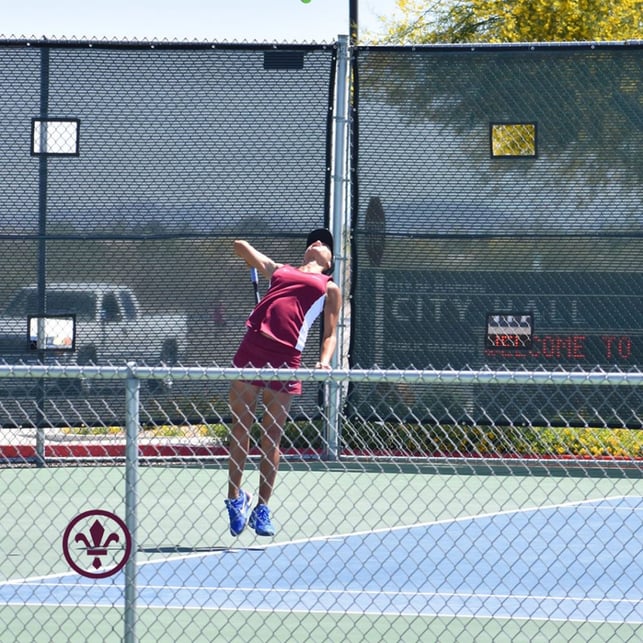
By Jackie Resler - Tennis Pro
All people have something that they care about, as they strive to reach their maximum potential.
This is how people become successful in general, whether it is in life or sports. Being a perfectionist is not automatically a detrimental character trait. But unless it is utilized efficiently, perfectionism can have major negative consequences for athletes throughout their career.
Usually in a sports setting, perfectionism is a highly sought after quality in which athletes strive for flawlessness. Perfectionism can help athletes achieve higher performance by increasing their physical and motor skills. Almost every professional tennis player is a perfectionist, and they have been able to use this trait to their benefit. For every successful perfectionist, there are myriads of tennis players who failed, because their inability to control their mentality led to detrimental results such as stress, emotional problems, and burnout.
The point of perfectionism is to be obsessive over a precise level of success, defined by a set of goals. Perfectionism manifests in two different ways: self-oriented perfectionism and socially prescribed perfectionism. However, self-oriented perfectionism is the main focus here. Self-oriented perfectionism is when athletes commit themselves to the highest standard of performance, and solely evaluates their own success on achieving these standards.
So, is perfectionism a good thing or bad thing? I believe it is a character trait that can be very beneficial to a player, but only if it is used correctly. Self-oriented perfectionism is a difficult character trait to conquer, as humans have a hard time recognizing their own nature. We have to understand that the pursuit of perfection does not guarantee growth and success. In fact, it usually has the opposite result, causing young talents to destroy themselves mentally. The key is finding balance between striving for success, and setting feasible goals for yourself. If you feel frustrated with your lack of success, it is okay to lower the standards to make the goal more achievable. Failing continuously at a near impossible goal can break your spirit mentally, and take enjoyment out of your favorite sport.

The learning process is key to building a strong foundation in your abilities, not the end result. If the focus is the end product, you are neglecting the learning process and will not progress your skills. In order to succeed in the learning process, you must keep the pressure on yourself at manageable levels. The scoreboard should not be your main focus, instead your abilities and improvement should be the main measurement of triumph.
Like many of you, I love to win. I absolutely hate losing. But how can one want to win but at the same time put less pressure on oneself to win? Well, it is a bit of a catch 22. Once we focus on the outcome, we tend to choke due to the increasing panic of every lost point. What we should focus on is performing the best we can in both competition and training. We have to put less pressure on ourselves because the high pressure can hurt our self-esteem. Wanting to win, but caring less and less about winning as the outcome, can help you be more motivated and train harder because you will focus on parts of your game that need work. This mentality can work if you do not dwell on the outcome of competition and training, but instead reflect on your skills and technique.
For elite self-oriented perfectionists, they understand and accept their perfectionist tendency, and mold their nature into success. They have to reduce their anxiety over the outcome in order to manage their perfectionism. Self-oriented perfectionists understand that when it comes to competition and training, they can only do the best they can. As athletes, they have to put in many hours of practice and training in order to be successful. Being a perfectionist can be manipulated into motivation, to stimulate your body and mind, instead of breaking down mentally. It is in our nature for us to have difficult goals and strive to achieve those goals. But if an athlete can be patient with their progress, and know when to take a break, the mental wear and tear will not happen. Perfecting your forehand is a crucial part of tennis, but rushing can lead to misunderstanding how a forehand works, and becoming frustrated when the foundation is not existent. Slow and steady wins the race, and fortifies the mind, possibly producing a long and successful career.
It took me years to make this progression and find the balance in my mind, and I am improving on making sure I control how my mind works. If perfectionism takes control of my game to the point where I have a fear of failing, I would become stuck. Having to be patient is a difficult task because it takes time to find a good balance between wanting to be the best and taking my time to get there. I can tell you that my progression has helped me win more matches at the collegiate level. If I lose, I have to tell myself that I did play the best I could for the day and contemplate on which part of my game needed work. Once I know what I need to work on, I put my best efforts in practice to work on that area of the game, by setting reasonable goals for myself, and focusing on the learning process.
So, being a perfectionist is not a bad thing as long as it can be managed. Having less pressure on yourself can help your game tremendously, but you need a desire to improve over time at the same time. It is crucial to not focus on negative outcomes from training and competition. The learning process will always exceed the end product. As a perfectionist, we have to learn to aim for excellence rather than perfection.
At the end of the day, it will be the tennis player that knows their mind and soul who wins, not simply the perfectionist tennis player.
Jen Azevedo is a tennis professional, pickleball professional, personal trainer, group exercise instructor, and the general manager of the Paseo Club. She loves the community at the Paseo Club and that it is also a safe and fun place for her daughter. Jen’s favorite activities are joining her tribe for trail races or her partners for tennis matches. Occasionally Jen slows down to relax with a book — she reads over 100 a year!

